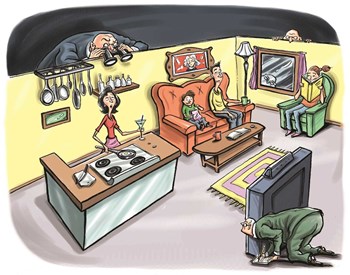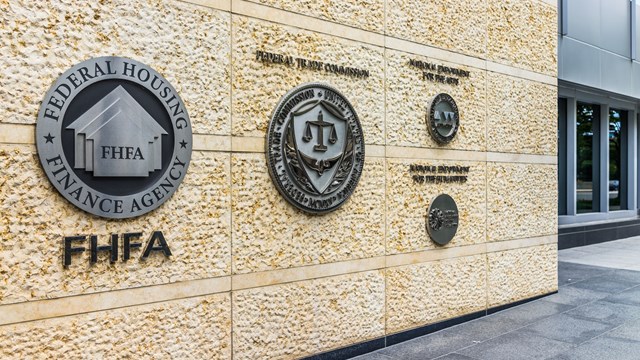
Condo and HOA residents often complain that their board doesn’t do enough, or that the board members aren’t involved as much as residents would like in the administration and maintenance of their community. While a disinterested or apathetic board is certainly a problem, going to the other extreme—becoming an overbearing, Big Brotherish cabal—can be just as bad, or worse.
Board members who overstep their bounds and intrude on the privacy and agency of individual residents are inviting trouble—so it’s important to understand the boundaries of board power, and know when something crosses them.
Knowledge is Power
To carry out their duties, condo and co-op boards need a certain amount of latitude, says Andrew McDonald, an attorney with the law firm of Lomurro Davison Eastman & Munoz PA in Freehold, and balancing what is right and what is expected can sometimes be tricky.
“Rules are needed in order to protect owners’ investments,” says McDonald. “After all, each individual owner agreed to the bylaws and governing documents when they bought their unit. Boards are given broad power to put people on notice, to fine them for the non-payment of common charges, assessments, and the like. At the end of the day, I think these boards are given a wealth of power because they have a responsibility to keep the [community] in good repair so that homeowners don’t lose their investment.”
Given all that, it’s important for board members to understand what being on the board means, and how to avoid overstepping their bounds. Sometimes, a board comprised of seemingly level-headed people can jump the tracks and head off in a direction that is neither productive nor healthy for their association.
“Some people get on a board and get a heady sense of power,” says Chuck Graziano, president of Thundering Brook Associates, a management company in Ramsey. “That can result in them adopting policies that are on the radical side, or overreacting to situations instead of a moderate response.”
For example, a condominium association might have rules prohibiting any decoration on the outside of the units. Technically, flying a veteran’s POW/MIA flag discreetly on a pole by the mailbox is a violation of the rule. So, too, might be hanging a holiday wreath on the door in December. But is it in the best interests of the association to crack down on patriotism and non-sectarian holiday spirit?
“It’s a gray area,” Graziano says. “It’s difficult for the board to deal with. You don’t want to have no decorations at all, but on the other hand, you have to abide by the rule. You have to walk the line.”
It’s essential that anyone who is elected to their board read their community’s rules and bylaws and understand what they can and cannot do as a board member. In the case of a new board member, veteran board members can often give advice and guidance.
“When someone new comes on, they get instruction from owners, management companies and other board members if they aren’t educated about those sort of things,” says David J. Byrne, a shareholder attorney with the law firm of Stark & Stark, with offices in New York and in New Jersey. “But in a practical setting, they don’t always read the documents they should.”
There are also differences to be taken into account from association to association, say the pros. Just because you served on your last board doesn’t necessarily mean you’ll join a new one knowing all there is to know about serving.
For example, “The power a board has in a co-op is different than that of a condo,” says Al Pennisi, a partner with the New York City-based law firm Pennisi Daniels & Norelli. “Co-op boards have more power than condo boards because they control the use of the apartments, they control the sales and leases where in a condo, the unit owner can sell at his or her discretion. Condo boards have less power, but both boards can make and enforce rules and regulation pursuant to their documents.”
Barging In
One of the chief complaints among residents who think their board has overstepped its bounds arises when someone—a super, handyman, or other building staff member—enters their home without permission, usually to check out something like a leak or electrical problem.
While it’s certainly not okay for a manager or building staff member to just waltz into an owner’s home without a very good reason, legal experts are quick to point out that communal living necessitates certain sacrifices. Among those is the understanding that building staff my periodically need to access your unit to reach plumbing, HVAC equipment, or other systems that serve the building as a whole.
So if there’s a leak in your unit that could damage adjoining units if it’s not taken care of, and you can’t be reached to let building staff into your unit, it’s reasonable to expect that the super or repairperson will access your apartment to deal with the situation—with or without your express permission. Upsetting as it might be to think of strangers entering your home without permission or supervision, that access is considered reasonable if it’s deemed necessary and in the best interest of the building.
According to Pennisi, co-op documents require you to give the board access to your apartment to make repairs—but that’s not usually the case in condos.
“If there’s a leak in the walls [of your condo,] they just can’t go in and break the door down,” he says. “It has to be a bonafide emergency. If water is leaking under your door and the super or manager has tried calling you and they can’t get in touch with you, they have right to break in and make repairs. I always tell my boards to bring a witness and go in with a camera and take pictures of what the apartment looked like. Don’t go by yourself in case something is stolen and it’s your word against [the owner’s.]”
Feeling Secure
Security in buildings has become a tricky issue in recent years, and since most governing documents were written prior to current concerns about terrorism and other threats, boards sometimes enact security measures that some residents feel may go a bit too far. But where is the line between “robust security program” and “invasion of privacy?”
Hard to say, says Byrne. “There could be ‘too much’ security in a practical way or an economical way, but not really from a legal point of view. The boards probably have a pretty broad discretion to set rules on security, so although it might seem like they are overstepping their power, they aren’t really.”
Some boards feel it’s necessary to place cameras throughout their buildings and grounds, thoroughly check IDs for all visitors, and control access to a degree that residents may feel is going too far. While it’s fair to say that most residents get a certain peace-of-mind from knowing access to their building is tightly controlled, Pennisi says others find it intrusive.
“People say, ‘You have no right to take my picture coming and going,’ or they object to having their Social Security number used as an ID” he continues. “But a number of courts have ruled that [building rules] supercede the individual’s right, because [buildings] have the right to know who’s coming and going. You can’t publish their information or show the videos, however. That would be going too far.”
Keeping Things Personal
When it comes to any personal information boards or managers might collect on building residents, civil rights and privacy laws have the final word. In short, boards and management are prohibited from making any of that sensitive information public.
According to one attorney however, “People make mistakes …most of the time it’s just errors, rather than fraud. I’m on a couple of boards where they distribute board applications to all board members, and they include a lot of personal details. You’d like to think that your board members are responsible with the information and will shred the information afterwards, but that doesn’t always happen.”
If materials are being handled properly, the attorney continues, one copy of your personal information should be kept under lock and key at the manager’s office. No one on the board should be distributing that information, or keeping copies for themselves.
Though rare, there have been cases where board members have—either through negligence or ignorance—acted improperly with building information or money. One property manager with offices in New York and New Jersey says he recently dealt with an unscrupulous treasurer.
“We had a situation where, in an effort to clear up the books of a building we’d just begun managing, we asked the board’s treasurer if it would be OK to send out two deposit checks that had been collected for [construction] work and move-in fees several years prior,” he says. “The deposits were clearly for a one-time item, and there really was no reason to keep holding on to them—they were just throwing off the balances, and we wanted to clean it up. The board’s treasurer suggested that we do a journal entry and make them ‘disappear.’”
The managing agent says that after explaining that these were real deposits that were owed to shareholders, “The treasurer continued to press the issue and explained that he had done this type of thing at his job all the time. I explained that we know the difference between correcting a journal entry and sweeping someone’s money under the carpet. Needless to say, the shareholders in question (who were also on the board) wanted their money. We ended up cutting them a check.”
Power Hungry
Most managers and board attorneys have at least one or two stories about boards who let authority go their head and wind up imposing ridiculous rules on their residents regardless of whether they actually have the authority to do so.
“Boards do sometimes abuse their power,” Byrne says. “I’ve encountered boards that don’t actually have published rules, yet think they do. There are boards that set unreasonable restrictions on things, or think they have the power to charge residents fines when they don’t.”
Keeping a board in check and on the right side of propriety and the law could be something as simple as pointing out that more rules are not always better.
“We simply like to remind the boards that we deal with that when they implement excessive amounts of rules that infringe upon their neighbors, these rules will often come back to bite the people who created them,” says one managing agent. “We’ve seen it time and again: a board puts practices into effect that are very difficult to enforce, and which the very people who implemented them are the ones who end up violating them the most. This is where we like to be the voice of reason. We ask that boards be realistic and use discretion, and ask if they would like these rules enforced upon them.”
Checks and Balances
Since board members are elected, building residents really have the final say if they think a board member is abusing his or her power. In other cases, a building’s manager or legal council will usually alert the board if board members’ behavior is heading into dangerous territory and the manager or attorney feels they’re abusing their power.
“A board can terminate a person or refuse to allow a sale,” says Pennisi, “but they have to act reasonably and within their governing documents. If they don’t, the courts will strike it. Usually the managing agents and their counsel guide them to not go astray.”
In the end, the best run associations are those whose boards and managers understand their roles, are familiar with their community’s governing documents, insist on transparency, and make sure they have nothing to hide from their residents—or each other.
Keith Loria is a freelance writer and a frequent contributor toThe New Jersey Cooperator.






9 Comments
Leave a Comment